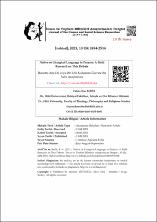| dc.contributor.author | Bedir, Fatma Nur | |
| dc.date.accessioned | 2021-11-01T18:19:05Z | |
| dc.date.available | 2021-11-01T18:19:05Z | |
| dc.date.issued | 2021 | |
| dc.identifier.citation | Bedir, F. N. (2021). Native or Liturgical Language in Prayers: A Field Research on This Debate. Itobiad: Journal of the Human & Social Science Researches, 10(3), 2494-2514. | en_US |
| dc.identifier.issn | 2147-1185 | |
| dc.identifier.issn | 2147-1185 | |
| dc.identifier.uri | https://app.trdizin.gov.tr/makale/TkRRNU56UXlNZz09 | |
| dc.identifier.uri | https://hdl.handle.net/11491/8275 | |
| dc.description.abstract | Language is an alive and dynamic phenomenon that grows, changes and expands by its nature. It is a vital tool to communicate with other people and to understand them. The importance of language for religion as a social and cultural phenomenon cannot be denied either. There are many studies mainly in sociology and literature in terms of the importance of language for prayer. Some of these studies discuss which language is more appropriate for prayer, while others discuss whether the translations meet the intended meaning. Besides, some studies draw attention to the use of daily language as a demonstration of one’s religiosity. There are various studies about language; however, in this study, its usage in prayers will be evaluated from a psychological point of view. Our aim in this study is to discover the function of the language in prayers as well as its importance and meaning in communication with God for the person. This research attempts to explore whether understanding or practice is influential on the individual’s religious experiences and actions. For this purpose, qualitative research was applied using a semi-structured interview technique, which included 12 theology faculty students determined by random and snowball sampling. The data obtained through in-depth interviews were analyzed using descriptive analysis method. As a result, it was determined that the participants attribute holiness to the liturgical language, albeit to varying degrees. While some participants attributed a sacredness as required by religious rules, others emphasized the social dimension or phonetic features of language and hence its emotional impact. Especially about adhan, the liturgical language has been conceptualized as sacred. Participants agreed that the adhan recitation should continue according to the tradition. The unifying feature of the adhan is the most effective factor in this. On the subject of salaah, we can say that the perceptions about the language used are similar and the importance of following traditions and personal habits are effective on this. In addition, despite the importance of “understanding” during worship and prayer, it is more preferable that rote movements without paying attention to meaning create a trance-like situation. In this case, meaning becomes important not during prayer, but rather during non-prayer times. | en_US |
| dc.description.abstract | Dil doğası gereği gelişen, değişen ve büyüyen, canlı ve dinamik bir fenomendir. İnsanların birbirleriyle iletişimini ve birbirlerini anlamalarını sağlayan önemli bir araçtır. Aynı zamanda, sosyal ve kültürel bir olgu olarak din açısından dilin önemi inkâr edilemez. Dolayısıyla dil ve ibadet üzerine daha çok sosyoloji ve edebi açıdan yapılmış çok sayıda çalışma mevcuttur. Bu çalışmaların bazıları ibadette hangi dilin daha uygun olduğunu tartışırken bazıları da çevirilerin anlatılmak istenen şeyi karşılayıp karşılamadığını tartışmaktadır. Ayrıca, kişinin dindarlığının göstergesi olarak günlük dil kullanımına dikkat çeken çalışmalar da mevcuttur. Dil ile ilgili çeşitli çalışmalar mevcuttur; ancak, bu çalışmada dilin ibadetlerdeki kullanımı psikolojik açıdan değerlendirilecektir. Bu çalışmadaki amacımız, dilin duadaki işlevinin yanı sıra kişi için Tanrı ile iletişimdeki önemi ve anlamını keşfetmektir. Bu araştırma, anlamanın veya uygulamanın bireyin dinî deneyimleri ve eylemleri üzerinde etkili olup olmadığını keşfetmeye çalışır. Bu amaçla, rastlantısal ve kartopu örneklem ile belirlenmiş 12 ilahiyat fakültesi öğrencisini içeren yarı-yapılandırılmış görüşme tekniği ile nitel bir araştırma uygulanmıştır. Derinlemesine mülakatlar uygulanarak elde edilen veriler betimsel analiz yöntemi kullanılarak analiz edilmiştir. Sonuç olarak, katılımcıların farklı derecelerde de olsa ibadet diline kutsallık atfettikleri tespit edilmiştir. Bazı katılımcılar dinî kuralların gerektirdiği şekilde bir kutsallık atfederken bazıları dilin sosyal boyutunu veya fonetik özelliklerini ve dolayısıyla duygusal etkisini vurgulamıştır. Özellikle ezan konusunda ibadet dili kutsal olarak kavramsallaştırılmıştır. Katılımcılar ezan okunuşunun geleneğe göre devam etmesi konusunda hemfikirlerdir. Bunda ezanın birleştirici özelliği en etkili faktördür. Namaz konusunda ise kullanılan dile ilişkin algıların benzer olduğu ve bunda gelenek ile kişisel alışkanlıkları takip etmenin öneminin etkili olduğunu söyleyebiliriz. Bunun yanı sıra ibadet ve dua sırasında “anlama”ya önem verilmesine rağmen ezbere yapılan hareketlerin trans benzeri bir durum yaratması daha tercih edilen bir durum olarak karşımıza çıkmaktadır. Bu durumda anlam, ibadet sırasında değil, daha çok ibadet dışında önemli hâle gelmektedir. | en_US |
| dc.language.iso | eng | en_US |
| dc.relation.ispartof | İnsan ve Toplum Bilimleri Araştırmaları Dergisi | en_US |
| dc.rights | info:eu-repo/semantics/openAccess | en_US |
| dc.subject | Din Psikolojisi | en_US |
| dc.subject | Dil | en_US |
| dc.subject | İbadet | en_US |
| dc.subject | İbadet Dili | en_US |
| dc.subject | Dinsel İletişim Dili | en_US |
| dc.subject | Psychology of Religion | en_US |
| dc.subject | Language | en_US |
| dc.subject | Prayer | en_US |
| dc.subject | Language of Prayer | en_US |
| dc.subject | Liturgical Language | en_US |
| dc.title | Native or Liturgical Language in Prayers: A Field Research on This Debate | en_US |
| dc.title.alternative | İbadette Ana Dil veya Din Dili Kullanımı Üzerine Bir Saha Araştırması | en_US |
| dc.type | article | en_US |
| dc.department | Hitit Üniversitesi, İlahiyat Fakültesi, Felsefe ve Din Bilimleri Bölümü | en_US |
| dc.identifier.volume | 10 | en_US |
| dc.identifier.issue | 3 | en_US |
| dc.identifier.startpage | 2494 | en_US |
| dc.identifier.endpage | 2514 | en_US |
| dc.relation.publicationcategory | Makale - Ulusal Hakemli Dergi - Kurum Öğretim Elemanı | en_US |
| dc.department-temp | Hitit Üniversitesi, İlahiyat Fakültesi, Felsefe ve Din Bilimleri Bölümü, Çorum, Türkiye | en_US |
| dc.contributor.institutionauthor | Bedir, Fatma Nur | |


















